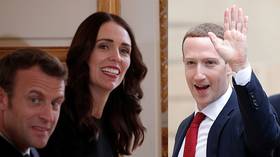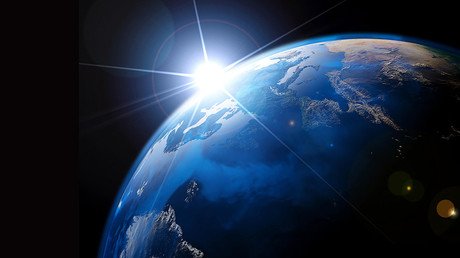‘Christchurch Call’ is a blueprint for more online censorship — and Zuckerberg is a big fan

There is nothing inherently wrong with the new ‘Christchurch Call’ to curb violent and terrorist content online. No one in their right mind wants mass shootings live-streamed — but it’s what comes next that should worry us.
Drawn up in the aftermath of the Christchurch mosque massacre, which was streamed live, New Zealand Prime Minister Jacinda Ardern’s ‘Christchurch Call’ is billed as a “roadmap for action” and calls for the “immediate and permanent” removal of “terrorist and violent extremist content” from social media platforms. It has been signed by 18 governments and eight tech companies.
On the face of it, that sounds fine. It’s difficult to argue against removing terrorist content from the platforms so many of us use on a daily basis. The trouble is, Ardern has already admitted that the pledge is simply a “starting point” — and if you were expecting this to be the moment at which social media companies finally began to push back a little bit, sorry to disappoint you, but they’re all in on it together.
Also on rt.com Facebook ban on Alex Jones and others is a form of modern-day book burningEndorsing censorship
Lord of social media, Facebook CEO Mark Zuckerberg, who is afflicted with an obvious and ever-worsening God complex, offered a full-throated endorsement of online censorship a few days ago, saying “...the question of what speech should be acceptable and what is harmful needs to be defined by regulation, by thoughtful governments.”
That’s right, Zuck thinks “thoughtful governments” should be deciding what is “acceptable” for us to say online. There’s no ambiguity there. It’s a simple, straight-forward endorsement of the idea that governments should be allowed to regulate our speech. If that doesn’t worry you, then maybe you’re the kind of person who reads dystopian novels and cheers for the wrong side.
Zuckerberg’s comment isn’t exactly out of the blue. Facebook is already under fire for censoring political speech from both the right and left ends of the political spectrum. The company has banned a slew of right-wing commentators and conservative agitators from its platform and taken worrying steps against leftist and anti-war activists around the world.
Just the beginning
So, if social media companies aren’t going to fight back on our behalf (and they clearly are not), who will? The obvious answer is “journalists” — but they don’t appear to be in too much of a rush to halt this creeping censorship either. Some of them appear to be advocating more censorship, rather than less.
Also on rt.com No kissing gays or conservative hunters: Overcautious Facebook blocks political ads in SwedenIn an interview with Le Monde on Monday, Ardern was asked why she decided to focus “uniquely on violent terrorist content, and not more broadly on hate speech, which also contributes to the drift in social media?”
Ardern replied that focusing on terrorist content was just the “point of departure” on which everyone could agree. So this is a journey we are on. We’ve departed at ‘terrorism is bad’ — but where will we end? Ardern said she was wary that going any further right now would “open the way for debate” on potential risks to freedom of expression. But in a joint press conference on Wednesday with French President Emmanuel Macron, she said her hope was that working together, governments and tech companies could “eliminate ideologies of hate.”
That would be lovely — and if only the word were so simple, we could just eliminate all the meanies from the internet and live in an online utopia. Unfortunately, this is completely unrealistic, and when you start talking about eliminating certain ideologies, that’s where things get sketchy. Particularly if we’re going to delegate the task of deciding what is and is not “harmful” (as Zuckerberg said) to “thoughtful governments.”
‘Hate speech’ or ‘free speech’?
Florida’s Republican governor Ron DeSantis is set to sign a bill that would make it a “hate crime” to “demonize” or “delegitimize” Israel. The bill purports to be about “anti-Semitism” but it’s really just a vehicle to censor and even criminalize political speech. You see, that’s the kind of thing that “thoughtful” politicians get up to if left to their own devices. Then again, the Florida bill probably isn't something that would ring alarm bells at Facebook HQ, either. Zuckerberg already happily complies with orders from the Israeli government to delete Palestinian activist accounts.
As for the US government, it has refused to sign Ardern’s ‘Christchurch Call’ citing first amendment rights — but declining to sign a vague and non-binding agreement doesn’t mean much. Capitol Hill is still swarming with politicians just dying to enforce more restrictions on free speech.
Also on rt.com France wants more govt regulation of Facebook and Zuckerberg calls it 'model' approachDemocratic Senator Chris Murphy tweeted in the aftermath of last year’s Infowars ban that the very “survival of [US] democracy” depends on Facebook’s willingness to “take down” more websites that “tear our country apart.” Sure, why don’t they just get rid of any content that could conceivably be categorized as divisive? Sounds like a foolproof plan.
A US government intelligence report last year highlighted a former RT show hosted by Abby Martin as an example of content that sowed “radical discontent” in society for critically covering controversial issues like US regime change wars, fracking, capitalism and police brutality. Be careful out there, you never know what could be defined as “radical” content next.
As journalist Igor Ogorodnev wrote in a recent oped, the aftermath of an atrocity “is a honeypot for short-sighted do-gooders buzzing about looking to do something, but also opportunist politicians to realize their long-harbored ambitions.”
Trying to distract us
Social media is what the public uses to organize en masse in the 21st century.
Is it any wonder that Macron, facing months of Yellow Vest protests against his government, is helping lead the charge toward more online censorship?
A French government report recently called for the eradication of content that damages “social cohesion” and warned that “false information,"“unfounded rumors” and “individuals pursuing political or financial objectives” can have an impact on “the social order.” But who decides what constitutes “false information” and “unfounded rumors”? Is Macron’s government “thoughtful” enough for Zuckerberg?
Also on rt.com White House posts call for social media censorship stories, triggering hope & cynicismOf course, it’s much easier for governments to pass the blame for social discontent onto companies like Facebook, while arguing that censorship is the only solution. If they didn’t do that, they’d have to admit that what really drives mass discontent are the neoliberal policies that have had a detrimental effect on basic standards of living, wiped out people’s life savings and ravaged the planet.
But maybe that’s all something Ardern and Macron can work on some other day — that is, if we’re allowed to talk about it.
The statements, views and opinions expressed in this column are solely those of the author and do not necessarily represent those of RT.














